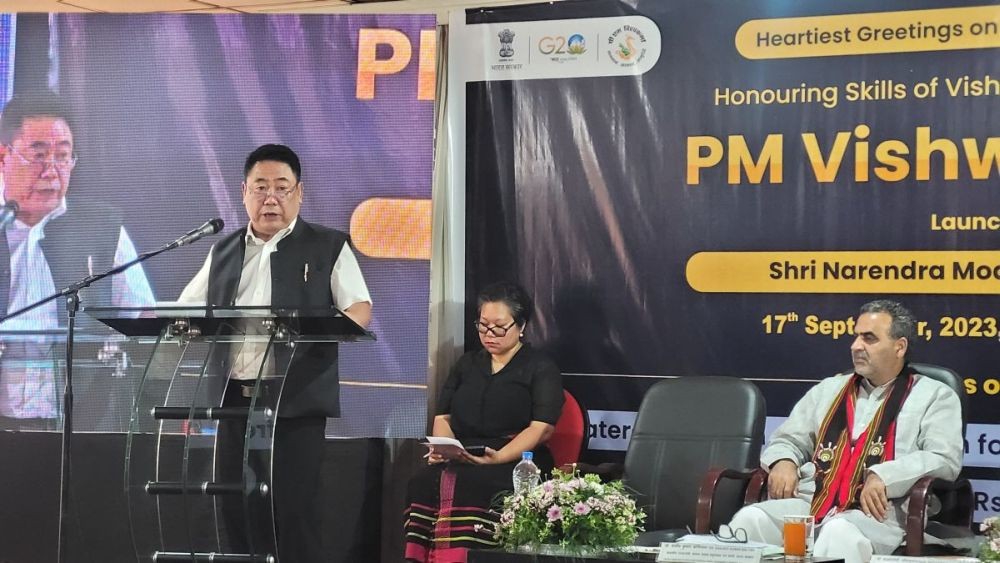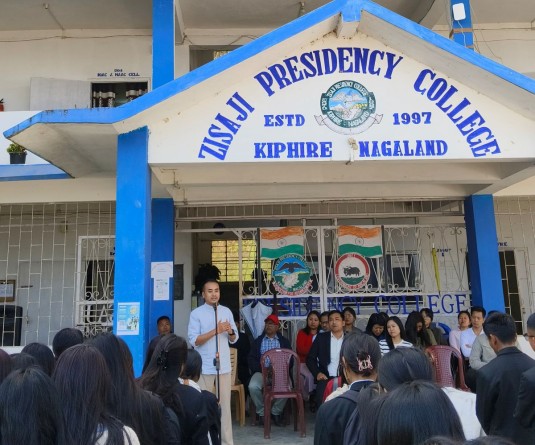Moatoshi Longkumer speaking at the launching programme of PM Vishwakarma scheme in Kohima on September 17. (Morung Photo)

Our Correspondent
Kohima | September 17
Nagaland’s Labour, Employment & Skill Development Advisor Moatoshi Longkumer today said that PM Vishwakarma scheme has the potential to change the economic scenario of the state.
Speaking at the launching programme of the scheme by Dr Sanjeev Kumar Balyan, Union Minister of State for Fisheries, Animal Husbandry & Dairying in Kohima, Longkumer said that Nagaland has a large reservoir of traditional skills that encompass a wide range of crafts, from artisanal pottery to handloom weaving, from woodworking to traditional agriculture and many more.
These skills have been honed over centuries and offer a wealth of untapped potential for economic growth and empowerment, he said adding that the promotion of these traditional skills can create employment opportunities, particularly in rural and marginalized communities.
By recognizing the value of these skills and providing the necessary support and training, we can create a pathway to economic prosperity that is both inclusive and sustainable, Longkumer said and called upon the people to “embrace our traditional heritage as a source of economic growth and empowerment for all.”
By providing training and support artisans and craftsmen, we can enable them to generate income through their talents, he stated, adding that this will not only reduces unemployment but also helps to alleviate poverty in regions where economic opportunities are scarce.
Traditional skills can foster entrepreneurship
The Advisor maintained that traditional skills can foster entrepreneurship. As individuals acquire proficiency in traditional crafts, they can establish their businesses, selling their products both locally and globally.
The appeal of handmade, authentic, and culturally rich products can open up new markets and export opportunities, contributing to economic growth, he said.
Furthermore, traditional skills often emphasize sustainable and environmentally friendly practices. For instance, traditional farming methods prioritize soil health and biodiversity, he added. By promoting such approaches, he said, we can support sustainable agriculture, reduce the ecological footprint, and contribute to long-term environmental stability.
With unemployment on the rise, entrepreneurship is viewed as a key solution to address and mitigate it, he noted.
“Therefore, to explore a path to economic upliftment through the revival and promotion of traditional skills that may seem unconventional in our rapidly digitizing world,” he said. The Advisor said that while modernization and technology have their merits, we must not overlook the significant/ economic benefits that can be derived from embracing and preserving our rich heritage of traditional craftsmanship.
Immense potential for micro-entrepreneurship
The Advisor said that Nagaland has immense potential for micro-entrepreneurship ventures that can address unemployment.
“Traditionally, the population has majorly depended on Government jobs as a source of sustainable livelihood. However, with the saturation of jobs in the government sector/combined with the lack of industrial activities and absent-of organized private sector in the state has hampered the employment opportunities of unemployed youths,” Longkumer said.
In addition to economic benefits, he stated that the revival of traditional skills can also help preserve cultural heritage. By preserving and passing them on the future generations, we ensure the continuity of our cultural identities, which can have positive economic implications, particularly in the tourism sector, he added.
Furthermore, Longkumer noted that traditional skills can empower individuals to become self-reliant.
State govt to work for success of Vishwakarma scheme
Nagaland Industries & Commerce Commissioner & Secretary K Kevichusa said that the Industry Department with the help of MoMSME will be implementing PM Vishwakarma scheme in Nagaland. He hoped that various departments and stakeholders, like Skill Development, will also come forward to ensure successful implementation of the scheme.
Assuring to put best effort, Kevichusa said that the government will set certain targets and will ensure reaching such targets. Commenting on the scheme, he said that the scheme is very targeted and “We hope that by using this scheme, we will be able to revive and promote some of our traditional skills and trades” that have not been given prominence before.
In Nagaland, Kevichusa noted that there are trades like blacksmithing and stone masonry that are very unique to certain areas only, and hoped that PM Vishwakarma scheme will provide a good opportunity for them (artisans) to upgrade and upskill and benefit themselves and the society.
Later, vote of thanks was proposed by Baidyanath Maharana, Director (Fin), NEEPCO Ltd.





